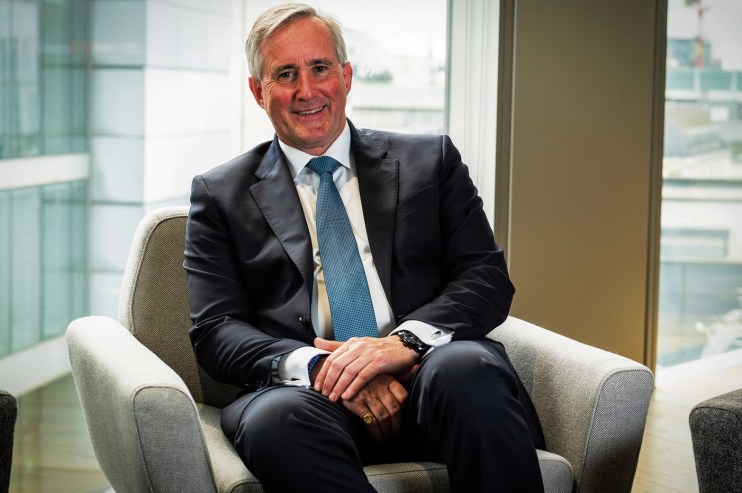UK Finance chair Bob Wigley: We need to create ‘reasons for banks to be in London’

Bob Wigley, a seasoned City veteran, knows a thing or two about banking. He has chaired UK Finance, the British banking sector’s representative body, since its creation in 2017 by condensing several lobby groups into one.
He was also instrumental in setting up TheCityUK, spent over a decade with investment banking giant Merrill Lynch and chaired the UK green investment bank commission for ex-chancellor George Osborne.
But, perhaps his proudest achievement is creating a unifying voice for Britain’s lenders through UK Finance, which yesterday celebrated its fifth birthday.
“We’ve managed to bring together six different organisations – which were doing quite different things – and mould them into one new culture. I think we’ve created what commentators acknowledge is probably one of the world’s leading policy formulation, advocacy and collaboration promoting bodies. So I’m really pleased,” Wigley, 61, said.
Improving ties with government has allowed banks to voice their policy recommendations to help shape the regulatory landscape to make lenders as efficient as possible.
The likes of Barclays, Lloyds and NatWest (formerly RBS) had lost influence with lawmakers after the financial crisis, creating a disconnect between the banking sector and government.
UK Finance was set up to mend that damaged relationship.
“The banking sector in the widest sense felt it had lost representation with government, it had six bodies that were not really related to the government, the messages the industry wanted the government to hear, and had lost traction with government in terms of delivering and having impact with those messages. So my main instruction, when this organisation was formed, was to reset and reestablish a relationship with government where we can actually have some influence.”
Stronger ties between government and banks meant policymakers could use the sector’s nimbleness to deliver essential Covid-19 support that limited the economic impact of the virus and lockdown measures.
Money poured into businesses across the country rapidly through the various recovery and business interruption loan schemes to replace income lost due to restrictions.
The speed at which that financial care package was rolled out may have been markedly different had UK Finance not got banks a seat back at the government’s table.
“We’ve had the opportunity to prove to the government and the public how important the banking sector is, through Covid, where I think we’ve demonstrated our ability to act rapidly and responsibly to support homes and businesses through an incredibly challenging period,” Wigley said.
Wigley has spearheaded an organisation that acts on behalf of firms that are operating in one of the most challenging business environments of any sector as a result of the financial crisis.
“We’ve had increased regulation, you have increased capital charges, still a reasonably challenging media environment and consumer environment,” he said.
UK banks are also subjected to one of the most punitive corporation tax regimes in the rich world. They are hit by the UK’s 19 per cent corporation tax rate and an eight percentage point surcharge, a policy introduced after the banking crisis.
Wigley worries keeping that punishment levy in place will make the UK “internationally uncompetitive”.
The absence of a post-Brexit deal between London and Brussels on financial services regulation, in addition to the heavy tax burden, means banks may look elsewhere to set up job-creating projects.
What Wigley wants to see from the government and chancellor Rishi Sunak is “a medium term roadmap for corporation tax,” something Britain’s biggest business group, the Confederation of British Industry, has also called for.
And, he wants to see robust accountability structures set up to ensure suggestions from Lord Hill and Ron Kalifa’s reviews are delivered.
We need “benchmarking KPIs, deliverables that are monitored so that every year we can see what progress has actually been made on the recommendations,” he said.
Capturing the efficiency gains on offer from Brexit also does not mean embarking on a mass rolling back of legacy EU regulation, but instead “incremental change, which, in aggregate, should make quite a significant factor in competitiveness, both domestically and internationally,” Wigley said.
He also wants the government to introduce “intelligence sharing powers” in the upcoming economic crime bill so banks can provide information to each other to help stop fraudsters.
Ultimately, Wigley’s modus operandi is to create “reasons for banks to be in London.”
Amen to that.